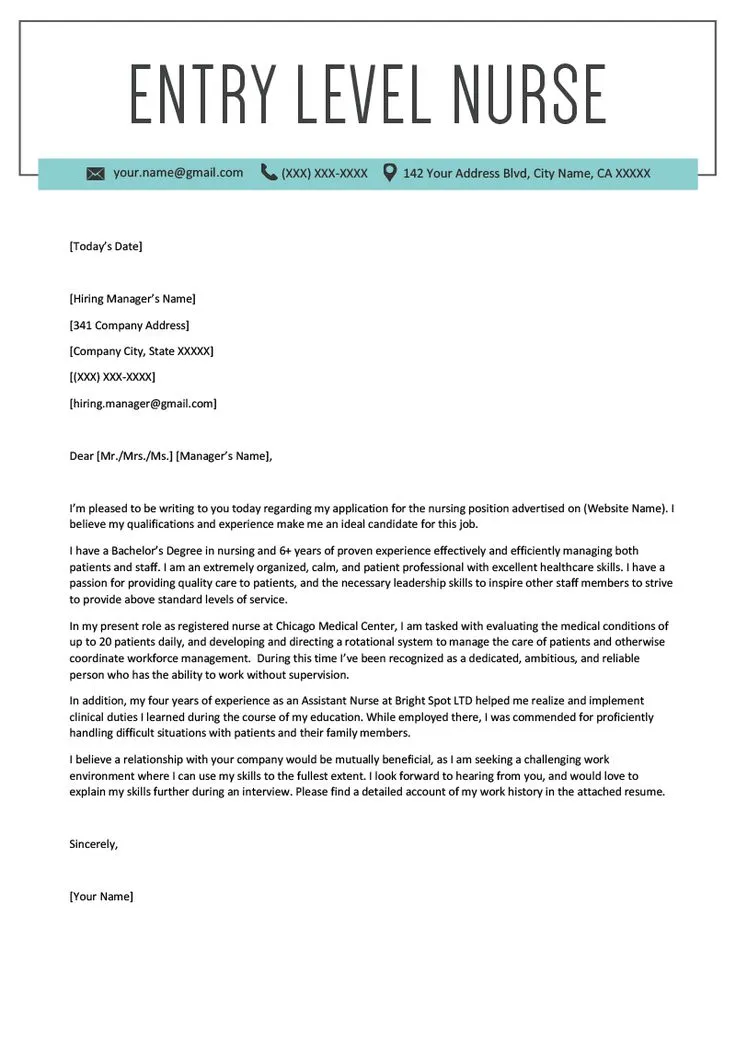Understanding the Importance of an RN Cover Letter
In the competitive field of nursing, a well-crafted cover letter is more than just a formality; it’s your initial opportunity to make a strong impression and showcase your qualifications to potential employers. It serves as a vital tool to highlight your skills, experience, and personality, setting you apart from other applicants. This article is dedicated to helping Registered Nurses (RNs) create cover letters that get noticed and land interviews. A compelling cover letter can significantly increase your chances of securing your dream nursing position. It allows you to provide context to your resume, explain career gaps, and demonstrate your passion for nursing, all of which are crucial in a hiring process where every detail matters. By investing time in crafting a personalized and impactful cover letter, you’re making a proactive step towards achieving your career goals.
Why a Cover Letter Matters for Registered Nurses
A cover letter serves as a personal introduction, allowing you to expand on the information in your resume and tell your unique story. It is where you can express your enthusiasm for the specific role and the healthcare organization, demonstrating that you’ve done your research and are genuinely interested. Many employers consider the cover letter as a reflection of your communication skills and attention to detail, qualities that are critical in nursing. It provides an opportunity to articulate your career goals and how the position aligns with your aspirations, showcasing your long-term commitment to the profession. Unlike a resume that lists facts, a cover letter allows you to display your personality and soft skills, which are vital in patient care and teamwork. A well-written cover letter can often compensate for a lack of experience or certain qualifications, highlighting your potential and eagerness to learn.
How a Strong Cover Letter Can Set You Apart
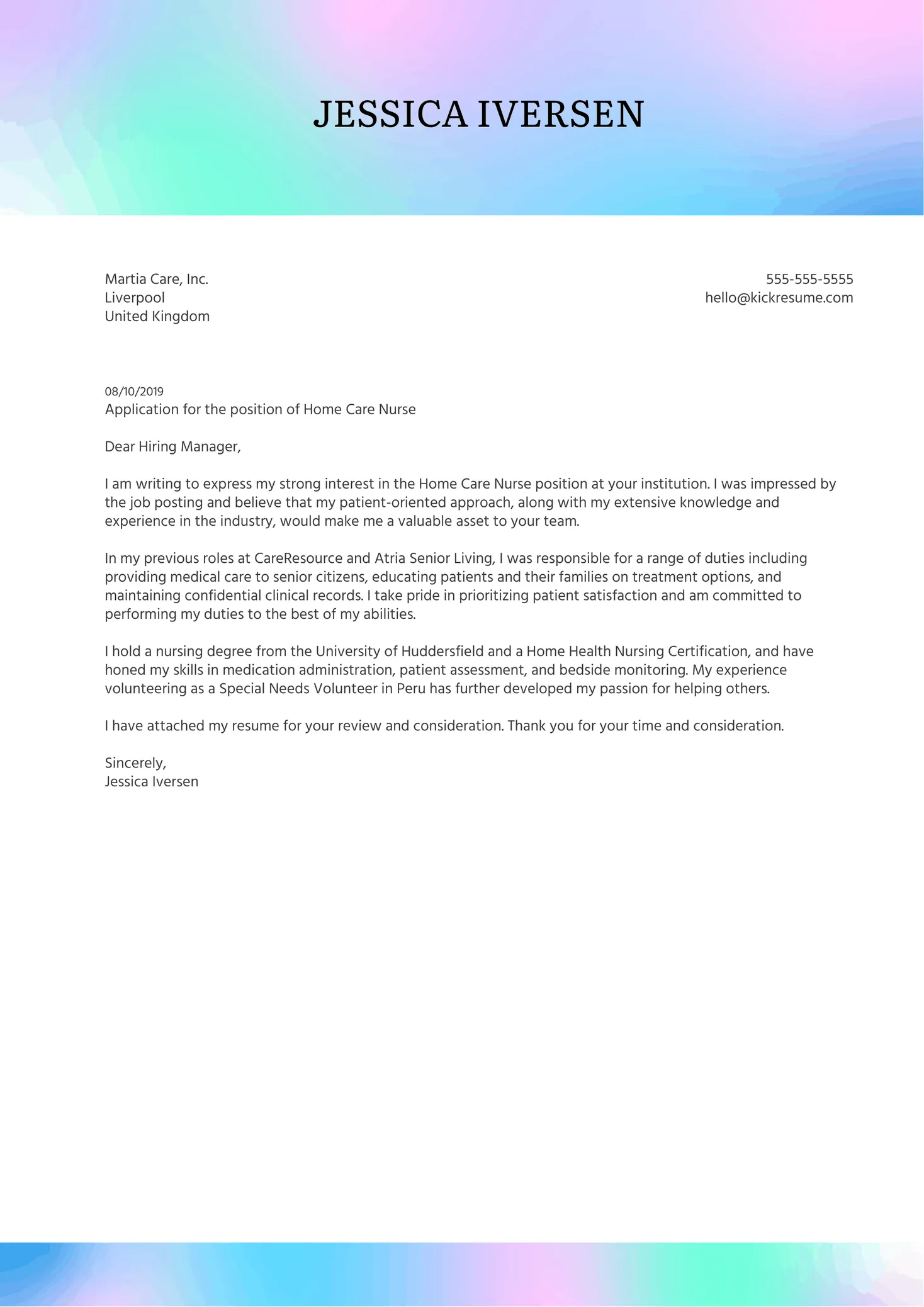
A strong cover letter goes beyond merely restating your resume; it offers a glimpse into your character and suitability for the role. It allows you to highlight specific accomplishments, skills, and experiences that make you the ideal candidate. By tailoring your cover letter to each job, you demonstrate that you’ve taken the time to understand the employer’s needs and are genuinely interested in contributing to their team. A well-structured and engaging cover letter can capture the hiring manager’s attention and make them eager to learn more about you. It shows that you possess excellent written communication skills, attention to detail, and the ability to present yourself professionally. Furthermore, it can address any potential concerns or gaps in your employment history, giving you a chance to explain them proactively.
Key Components of a Powerful RN Cover Letter
Your Contact Information and Introduction
Start your cover letter with your contact information, including your name, address, phone number, and professional email address. This ensures the hiring manager can easily reach you. Follow this with the date and the hiring manager’s name and title (if you have it) and the name and address of the healthcare facility. The introduction should immediately capture the reader’s attention. State the position you’re applying for and briefly mention where you saw the job posting. Then, express your enthusiasm for the role and the organization, showing that you’ve done your research and are genuinely interested in the opportunity. This sets the tone for the rest of your letter, conveying your professionalism and eagerness to contribute.
Crafting a Compelling Opening
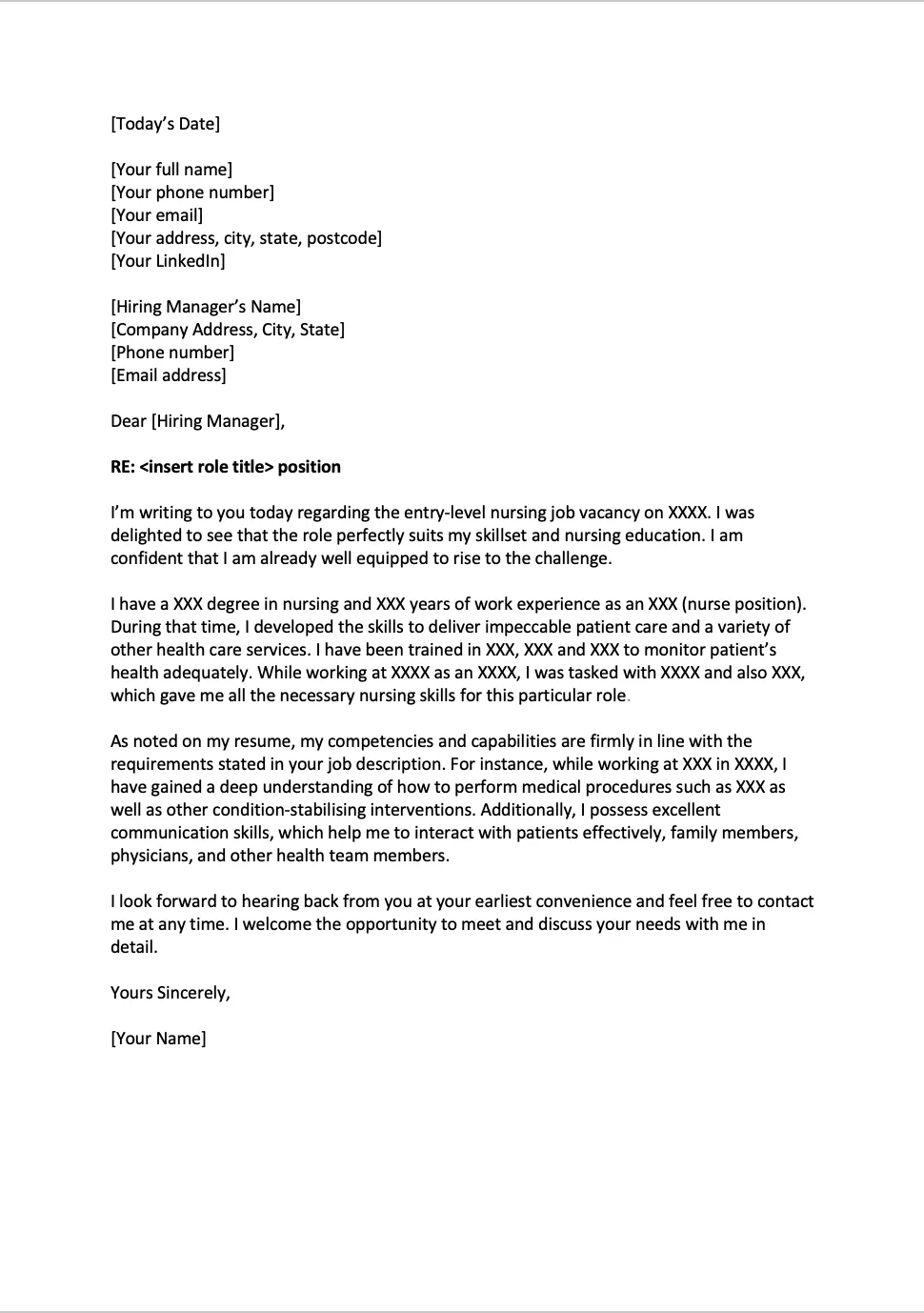
Your opening paragraph should immediately grab the reader’s attention. Instead of a generic greeting, consider a compelling hook that highlights your passion for nursing or a relevant achievement. Briefly mention how your skills and experience align with the job’s requirements. Avoid clichés and focus on showcasing your unique value proposition. An effective opening sets the stage for the rest of your letter and encourages the hiring manager to read on. Use action verbs and keywords from the job description to demonstrate that you understand the position’s needs and are a perfect fit. Express your enthusiasm for the role and the organization. Make sure your introduction is concise, professional, and reflects your personality. It should leave the reader wanting to know more about your qualifications.
Highlighting Your Nursing Skills and Experience
This is where you showcase your most relevant skills and experiences. Focus on those that align with the job description. Provide specific examples that illustrate your abilities and achievements. Quantify your accomplishments whenever possible. For instance, instead of saying, “Managed patient care,” state, “Managed a team of nurses to provide care to over 50 patients daily, ensuring high patient satisfaction rates.” Use clear, concise language and avoid jargon that the hiring manager might not understand. Tailor this section to the specific requirements of the job. Explain how your skills and experiences make you the perfect fit for the role. Always emphasize your commitment to patient care and your ability to work effectively within a healthcare team.
Showcasing Your Clinical Skills
When discussing your clinical skills, be specific and detailed. List your proficiency in areas such as medication administration, wound care, IV insertion, and electronic health records (EHR) management. Provide examples of how you have successfully applied these skills in previous roles. Mention any specialized certifications or training you possess, such as advanced cardiac life support (ACLS) or critical care experience. Highlight your experience in various clinical settings, demonstrating your versatility. Use action verbs to describe your responsibilities and accomplishments. Always emphasize your ability to provide high-quality patient care and maintain patient safety standards. By showcasing your clinical skills effectively, you reassure the employer that you possess the necessary expertise to excel in the role.
Demonstrating Soft Skills and Attributes
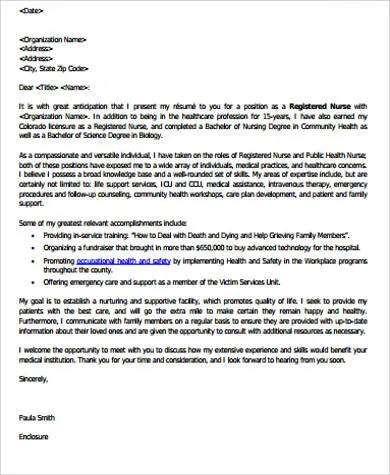
In addition to clinical skills, emphasize your soft skills, such as communication, teamwork, problem-solving, and leadership. These attributes are critical in nursing and contribute to a positive work environment and improved patient outcomes. Give examples of how you’ve demonstrated these skills in your previous roles. For example, if you have excellent communication skills, describe how you effectively communicate with patients, families, and other healthcare professionals. If you are a team player, give an example of a successful collaborative project or situation. Mention your ability to handle stressful situations and make quick decisions. Show your empathy, compassion, and ability to provide excellent patient care. Make sure to show your enthusiasm for the role and your commitment to the values of the organization.
Quantifying Your Achievements
Whenever possible, quantify your achievements to provide concrete evidence of your capabilities. Use numbers and statistics to demonstrate your impact. For example, if you improved patient outcomes, specify the percentage increase in patient satisfaction scores or the reduction in readmission rates. If you streamlined a process, indicate how much time or resources you saved. Quantifying your achievements makes your accomplishments more tangible and impressive. It shows that you are results-oriented and able to make a significant contribution. Use data to support your claims and provide a clear picture of your value. Make sure that the numbers are accurate and relevant to the role you are applying for.
Providing Specific Examples
Provide specific examples to illustrate your skills and experiences. Use the STAR method (Situation, Task, Action, Result) to structure your responses. Briefly describe the situation, outline the task you needed to complete, explain the actions you took, and detail the results you achieved. This method helps you to provide clear, concise, and compelling examples that demonstrate your capabilities. For example, if you improved patient outcomes, describe the specific steps you took, such as implementing a new protocol or training staff. Make sure your examples are relevant to the job requirements and showcase your skills in the most favorable light. By providing specific examples, you create a vivid picture of your abilities, making it easier for the hiring manager to understand your value.
Expressing Your Enthusiasm and Interest
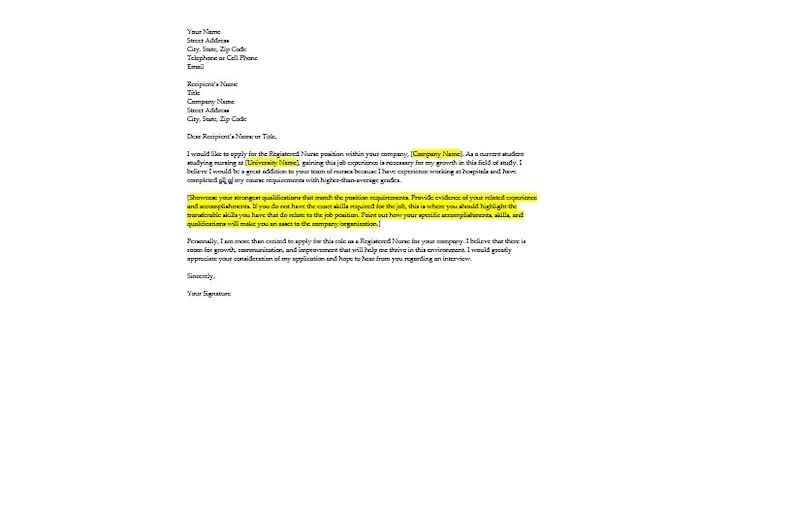
Throughout your cover letter, express your enthusiasm for the role and the healthcare organization. Show that you are genuinely interested in the opportunity and that you have researched the organization. Mention any specific programs, values, or initiatives that resonate with you. Demonstrate how your values align with those of the organization. Express your excitement about the prospect of joining the team and contributing to its mission. Your enthusiasm will make a positive impression on the hiring manager and show that you are eager to succeed in the role. End your cover letter with a clear statement of your desire to be considered for the position and your availability for an interview.
Tailoring Your Letter to the Specific Job
Customize your cover letter for each job application. Don’t use a generic template. Review the job description carefully and identify the key requirements and qualifications. Tailor your letter to address these specific needs and showcase how your skills and experience align with them. Highlight the experiences and skills that are most relevant to the position. Use the same keywords and phrases from the job description. This shows that you have taken the time to understand the role and the needs of the employer. By tailoring your cover letter, you significantly increase your chances of being selected for an interview. Always make sure that your letter is free from errors and is tailored to the specific role you are applying for.
Researching the Employer
Before writing your cover letter, research the healthcare organization. Visit their website, read about their mission and values, and understand their current initiatives and goals. This shows that you are genuinely interested in the opportunity and that you have taken the time to learn about the organization. Mention specific aspects of the organization that appeal to you and how your skills and values align with theirs. If possible, find out the name of the hiring manager and address your cover letter to them directly. Tailoring your cover letter in this way demonstrates your attention to detail and your commitment to the role.
Addressing the Hiring Manager Directly
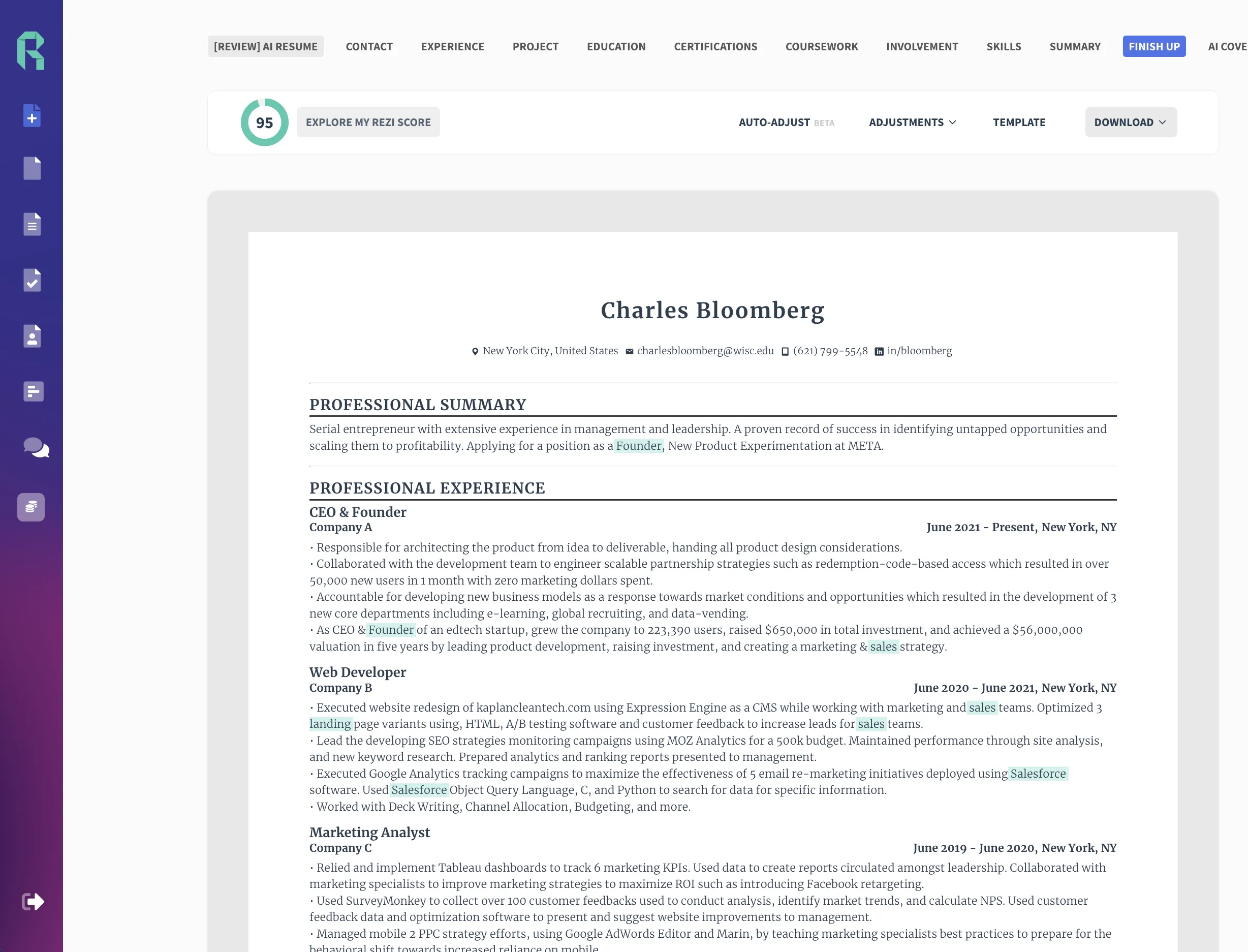
Whenever possible, address your cover letter to the hiring manager by name. This demonstrates that you have taken the time to research the organization and are personally interested in the opportunity. If you cannot find the hiring manager’s name, use a professional salutation, such as “Dear Hiring Manager.” Avoid generic greetings like “To Whom It May Concern.” In the body of your letter, mention your understanding of the organization’s mission and values and how your skills and experience align with their goals. By addressing the hiring manager directly and demonstrating your knowledge of the organization, you show your commitment to the role and increase the chances of your application being noticed.
Formatting and Proofreading Your Cover Letter
Choosing the Right Font and Format
Choose a professional and readable font, such as Times New Roman, Arial, or Calibri, with a font size between 10 and 12 points. Use a standard format with clear headings, concise paragraphs, and appropriate spacing. Ensure that your letter is well-organized and easy to read. Avoid using excessive bolding, italics, or underlining, which can distract the reader. Use a simple and consistent formatting style. Use the correct format for your contact information, the date, and the hiring manager’s information. Proofread your cover letter meticulously before submitting it to ensure there are no grammatical errors or typos. The formatting and layout of your letter contribute to the overall impression, so attention to detail is essential.
Proofreading for Grammar and Spelling Errors
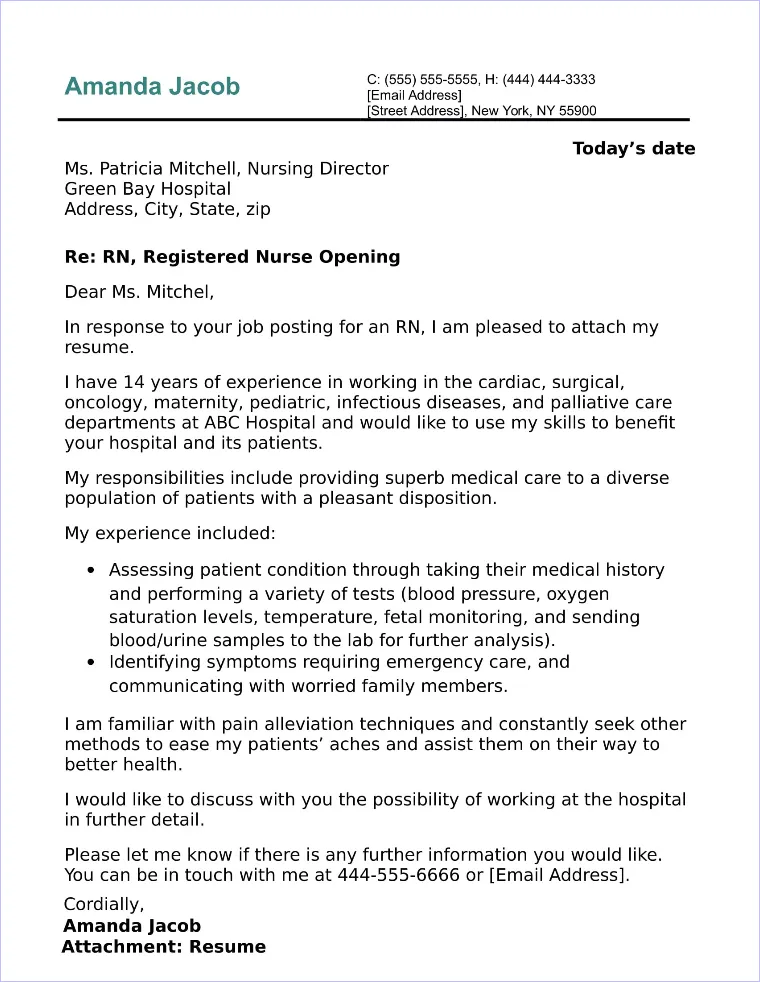
Proofreading is a critical step. Grammar and spelling errors can undermine your credibility and make you appear unprofessional. Carefully review your cover letter for any typos, grammatical errors, and punctuation mistakes. Read it aloud to catch any awkward phrasing or sentences that don’t flow well. Use spell-check and grammar-check tools, but don’t rely on them entirely. It’s best to have a friend, colleague, or career counselor proofread your letter as well. Multiple sets of eyes can help catch errors that you might miss. Correcting these errors is essential to making a strong first impression. Accuracy demonstrates attention to detail, which is vital in healthcare.
Using Action Verbs and Keywords
Use action verbs to describe your responsibilities and accomplishments. Start each bullet point or paragraph with a strong action verb, such as “Managed,” “Implemented,” “Trained,” “Developed,” or “Collaborated.” Use keywords from the job description throughout your cover letter. This shows that you understand the requirements of the position and that you possess the necessary skills and experience. By strategically incorporating keywords, you increase the chances of your cover letter being noticed by applicant tracking systems (ATS). Tailor the wording of your letter to the specific job requirements, highlighting skills and experiences that align with the role. Using action verbs and keywords effectively increases your cover letter’s impact and improves your chances of landing an interview.
The Closing and Call to Action
Expressing Gratitude
Thank the hiring manager for their time and consideration. Express your appreciation for the opportunity to apply for the position. Briefly reiterate your interest in the role and the organization. Use a professional closing, such as “Sincerely,” “Best regards,” or “Thank you.” The closing should be polite and leave a positive final impression.
Providing Your Contact Information Again
Reiterate your contact information, including your phone number and email address. Make it easy for the hiring manager to reach you. Consider including a link to your professional online profile, such as LinkedIn. Ensure your contact information is accurate and up-to-date. This makes it easy for the hiring manager to reach you for an interview.
Following Up After Submitting Your Application
After submitting your application, send a follow-up email or call to express your continued interest and reiterate your qualifications. Follow up within a week or two of submitting your application. In your follow-up, thank the hiring manager for their time and reiterate your interest in the role. Briefly highlight your key qualifications and explain how they align with the needs of the position. Reiterate your enthusiasm for the opportunity and express your availability for an interview. This demonstrates your proactive approach and your genuine interest in the position. It is another chance to make a positive impression and increases your chances of landing an interview.
